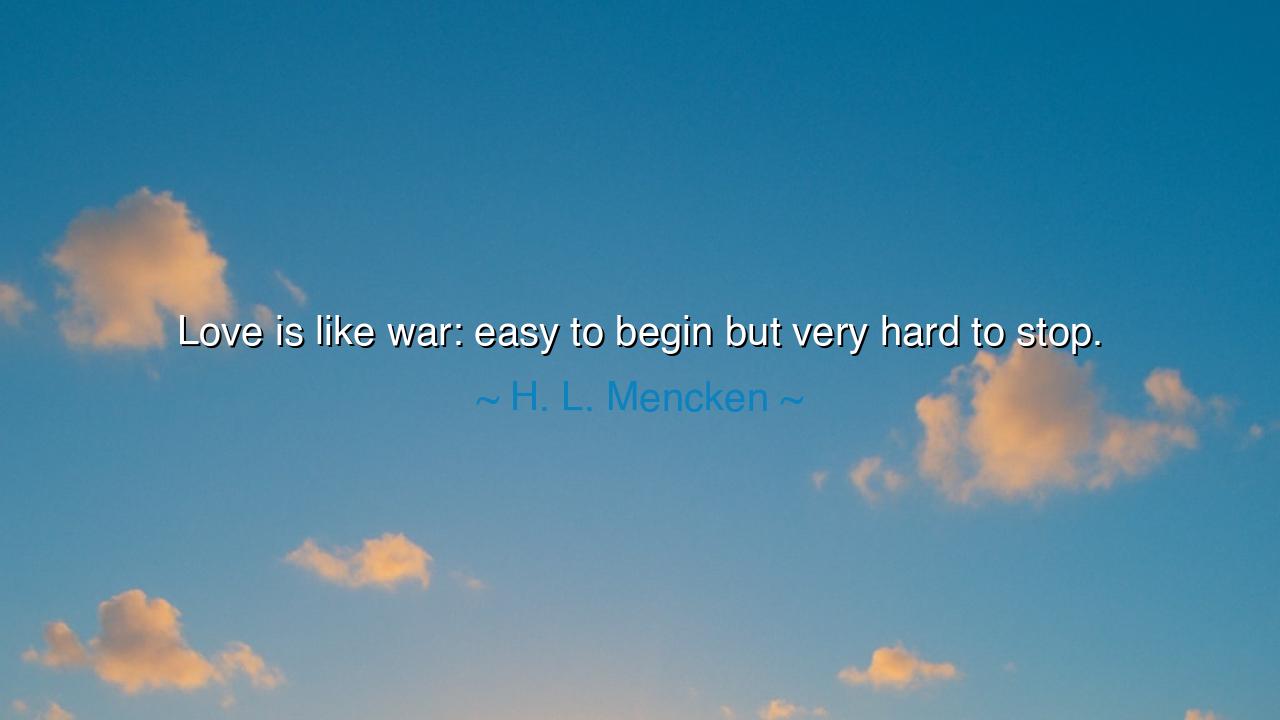
Love is like war: easy to begin but very hard to stop.






"Love is like war: easy to begin but very hard to stop." – H. L. Mencken
In the sharp yet timeless wit of H. L. Mencken, we find a truth both humorous and profound. “Love is like war: easy to begin but very hard to stop.” In these words, Mencken — the philosopher of irony and human nature — reminds us that love, though often entered with joy and passion, is no simple affair. Like war, it is born in fire and fought with intensity; it sweeps away caution, consumes reason, and binds the hearts of those who engage in it. It begins in a spark — a glance, a word, a smile — and before one knows it, the heart is caught in its own battle, for love, once kindled, rarely obeys the command to cease.
Mencken, known for his sharp tongue and skepticism, was no stranger to the complexities of human emotion. He observed that love, like conflict, is fueled by forces both noble and destructive — desire, pride, passion, fear, and hope. It begins in excitement and adventure, but as it deepens, it tests courage, endurance, and faith. The ancients, too, saw this truth. They likened love to the arrows of Eros, the god whose aim could wound even the divine. To fall in love was to be struck by a force beyond control — beautiful, yes, but perilous. The same hand that begins the battle cannot easily command the heart to surrender.
Love, like war, transforms those who enter it. At first, there is strategy and conquest — the thrill of pursuit, the sweetness of victory. But as the days lengthen and the heart is entangled, love becomes something more profound, and sometimes more painful. The struggle shifts inward: one must learn patience, humility, forgiveness. And just as wars are easy to ignite but hard to end, love’s fire, once awakened, cannot be easily extinguished. Even when lovers part, the echoes of their union remain — memories that burn, lessons that linger, and scars that time cannot wholly erase.
Consider the story of Napoleon Bonaparte and Josephine de Beauharnais, whose love began with an explosion of passion and ended in heartbreak. Napoleon, fierce in ambition and pride, adored Josephine beyond reason. He wrote to her in exile and in battle, calling her his guiding star. Yet their love, like his wars, consumed all it touched. It brought triumph and ruin in equal measure. When he finally divorced her, he said, “I truly loved my Josephine, but ambition and empire tore us apart.” Their tale mirrors Mencken’s wisdom — love, once begun, cannot be easily stopped; it becomes part of one’s destiny, leaving the soul forever changed.
Yet, Mencken’s words are not only warning but revelation. They remind us that love and war share the same paradox — they are born of human longing for connection and meaning. Both require courage to begin and greater wisdom to endure. Love is not a peaceful field; it is a battlefield of the heart where ego and vulnerability collide. To love is to risk loss, to lay down one’s armor, and yet to fight daily — not against another, but for the survival of trust, compassion, and truth. And once begun, love demands persistence, for its end is never clean or simple, but woven into the soul.
The ancients would have said: “He who enters love must be as brave as he who enters war.” For both require surrender to forces beyond control. To begin love is easy — the heart leaps, the world brightens. But to sustain it, to navigate its storms, to bear its wounds and still choose it anew — that is the work of warriors, not dreamers. Love asks of us patience where passion fades, gentleness where anger flares, and forgiveness where pride once ruled.
So, my children of the eternal heart, take this teaching as both counsel and blessing: approach love as you would approach battle — with courage, humility, and honor. Do not fear its beginning, for it is one of life’s greatest adventures; but be mindful of its power, for once begun, it will shape you in ways you cannot foresee. When the fires burn too hot, remember to temper them with understanding. When the battle feels endless, remember that love is not to be conquered, but cultivated.
For as H. L. Mencken reminds us, love is like war: easy to begin but very hard to stop. It is both our greatest danger and our greatest glory. And though it may leave us scarred, it also leaves us alive — for the one who has loved, and fought for love, has truly lived.






AAdministratorAdministrator
Welcome, honored guests. Please leave a comment, we will respond soon